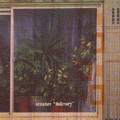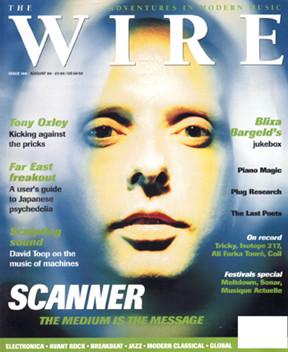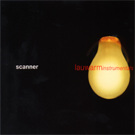SCANNER INTERVIEW
home
News
New Reviews
Reviews Archive
Interview Archive
Hall Of Fame
Links
Contact

- And I was actually talking to John Balance of Coil at the time, and he said "what a fantastic title." And I said: "yeah, you are right. I have to use that for a record." So for two years I've kept that title in mind. And suddenly it dawned upon me in the last few months, and I've talked about it to some people, and they said "that is rather a negative term, isn't it, for a record?" And I thought that America might perceive it as really negative, I don't know. But America can be so conservative about these type of things. So I changed it to Lauwarm, which is German for lukewarm. And I like the fact of having an album title that even the label can't pronounce properly. They just go something like loo-or-warm. It's lau-varm. It's a soft "w", that's important. So it's meant to be a deceptive title. A bright, slightly witty title in it's way if it was Lukewarm. But Lauwarm is poetic enough and doesn't tell you anything about what it is. And even the first track doesn't really give you a clue as to how the album is working and what genre it is fulfilling.
There is a large element of very sad string chords on it, where were these tunes coming from?That was me having a bad year (laughs). No in terms of...actually it was the Derek Jarman homage (The Garden Is Full Of Metal, released under his own by Sub Rosa in 1998) that was the first where I really felt like this. Which was like "just do it Robin, just make a record that means something to you very personally." Obviously have ideas and think about structures and narrative, etc, etc. But at the same time make a record that is quite passionate. And not worry about how a critic, how a public might perceive it. And so that's what I've done with this record. It hasn't been a good year emotionally for me. I just tried my best to work through those feelings with sound, which is something that I haven't done sometimes. Maybe I've intellectualised a bit too much, I don't know.
- I'm always drawn to string pieces. I'm working...I've been invited to work with a symphony orchestra next year in Norway. And if that happens that is a brilliant opportunity to work with traditional musicians in a very unusual way. But for this, you know, there is something that has always appealed to me about the passionate quality of the use of strings. And hopefully it works. It can be quite seductive around the more abstract textures. The second track, the "Passage De Recherche" track is all processed voices, all the sounds apart from the strings. All those strange glitchy noises and everything, is all people on the telephone. Everything just melted within the sampler.
Ah, I was wondering about that because there are not too many obvious telephone samples used.I've often processed these kind of indiscriminate signals that I pull down. When I do concerts I use the voices far more at times, but on a record I'm aware that on repeated listens you don't want to hear the same thing again and again. You start tuning in maybe in the wrong way. I like using the sound palette that is available from the scanner and seeing what I can do with it.
You mentioned personal problems, can you can speak about it?Probably not really, no (laughs). It's not worth talking about honestly. But enough to fire me up. Like the first track, "Immemory," is my closest...I remember listening to the Swan's final album (Soundtracks For The Blind), that amazing double cd, before I made that first track. And that album is just completely...it just washes me away. It is incredible. It is just an amazing record and an amazing band still, I feel. This record is almost my subtle tribute to Swans.
The monster drums there...Yeah the kind of monster drums in 5/4 time. With a static keyboard drone and organ just sitting there floating away. Just building and building in tension, but never releasing it. Just getting faster and faster and more and more intense, but never actually releasing that tension. Which is something that the Swans were always incredibly well capable of.
Absolutely. Do any of the new cd's tracks have interesting backgrounds?One of them, "Sonnenlicht," means "sun light," and actually I moved to a new place last year on Sunlight Square. So that is named after the place where I now live, which was a quite important step in my life. So it's about change and new movement and everything. The other pieces all reference something. "Vertical Line" is the line that goes through history. The way we trace our line through history in terms of memory. The way we cut lines into the earth's core, you can do it to your own human stance and work out your own personal history. They call that the "vertical line."
- "Passage De Recherche" is actually like passage of memory, basically. Using all these voices as sources of memory. And they are all sourced from old cassettes, so they are like archiving. A lot of the sound on there is actually taken from old four-track recordings of mine, and Walkman recordings - that kind of thing. It's quite a personal record in that way.
There is one thing I noticed, first in your remix of Bump & Grind and now on the new album, the use of Terry Riley-style organ elements.That's funny, yeah. I don't know how that happened actually, just one day I started playing these patterns. Actually that Bump & Grind mix is so old (found on a 12" and the Init Sequence cd from Sub Rosa). That is about four and a half years old, that track. Really, really old. They are friends of mine from Belgium. It just took so long for that to come out. I've never had anything that's taken so long to come out. But that use of repetition is something that has always appealed to me. I've always been a Terry Riley fan. I've always been a Steve Reich fan. I haven't been a Steve Reich remix fan, I must confess.
No.But, the original work has been an influence on me. I've always been a keen listener to the 60's minimalism. Charlemagne Palestine too, that whole group of artists. So this use of the little organ patterns...I like the fact that the palette is just gently changing over the length of the piece. Obviously I'm not as dedicated as Riley or Reich, who take thirty minutes to establish a piece. I sort of get it over with in eight or ten, but they are definitely an influence on me.
In that Bump & Grind remix did you sample Riley or were you playing in the style of?No, it is all played, there is no samples, just me playing. Me just sitting there, you know, playing fast.
Scanner's new Sulfur/Sulphur label
Scanner's Montreal performance
Scanner's website

Discography
major recordings:
1992 scanner 1 Ash Int CD
1993 scanner 2 CD Ash Int
1994 scanner - mass observation Ash Int CD
1995 scanner - spore New Electronica CD/LP
1996 scanner - sulphur Sub Rosa CD
- mimetic flesh CD
- sub rosa live sessions 1 London CD
- sub rosa live sessions 2 Paris CD
- sub rosa live sessions 3 New York CD
scanner - mort aux vaches: accretions Staalplaat CD
1997 scanner - delivery Earache CD/LP
scanner vs signs ov chaos Earache CD/LP
1998 robin rimbaud - the garden is full of metal Sub Rosa CD
scanner - sound for spaces Sub Rosa CD review
scanner - stopstarting CD
1999 scanner - lauwarm instrumentals Sulfur/Sulphur/Beggars Banquet CD
scanner - 20>2000: cystic Noton/Rastermusic CDEP
- I'm always drawn to string pieces. I'm working...I've been invited to work with a symphony orchestra next year in Norway. And if that happens that is a brilliant opportunity to work with traditional musicians in a very unusual way. But for this, you know, there is something that has always appealed to me about the passionate quality of the use of strings. And hopefully it works. It can be quite seductive around the more abstract textures. The second track, the "Passage De Recherche" track is all processed voices, all the sounds apart from the strings. All those strange glitchy noises and everything, is all people on the telephone. Everything just melted within the sampler.

I first met Robin Rimbaud aka Scanner when he visited Toronto during a vacation to the States in the summer of 1992. We had a mutual friend, Anthony, in Buffalo, New York, who had corresponded with Robin after he released the Peyrere compilation tape which featured Coil, Current 93, Nurse With Wound, Test Dept and others. Robin and his brother Tony had tracks on this rare 1986 tape as well, as a band named Dau Al Set after the post-war Spanish avant-garde art group. From the sound of their two tracks on Peyrere, Dau Al Set were a hard-hitting Test Dept-style project and Robin now admits to having two small edition albums and a couple international tape compilation appearances.

Robin was the first person I had met who had Halfer Trio videos, and although we never arranged a trade, we corresponded as the Scanner project was launched on his Ash International label in 1993. Soon his use of the scanning device to incorporate radio telephone conversations into his long-form electronic pieces caught the attention of the British media.
Robin benefitted from being in the right place at the right time when he became a focal point for the discussion of issues of privacy and voyeurism as the (uninformed) use of such mobile phones grew. And he certainly rose to the occasion, being a great conversationalist, brimming with enthusiasm and knowledge of art and music.
He used his new profile to promote post-industrial and DJ culture music through his club night, the Electronic Lounge, running since 1994 at London's ICA (the scene of infamous actions by Neubauten and SPK, who's concert "riot" was hinted at by the foreshadowing sound byte from a bootleg, heard on Ash 1.1).
Robin's dedication to the artistic side of things was put to the test when Bjork sampled a bit of his 1995 album for the New Electronica label, Spore. From the label's point of view this unapproved sample on a world-wide best-selling album was worth a nice bit of change to them in publishing royalties, but Robin insisted they not put him on the corporate side of the copyright issue, especially when his source material is illegally scanned from the public airwaves, effectively ending his deal with New Electronica.
That year Robin had enough commissions to work on Scanner full time. He left the Ash International label to be run completely by his former partners at Touch, but still threatens to complete the Beacon release that was announced but never finished. Since then Robin has been very busy working on several levels at once, including both the independent music scene and the international art world.
After the first three Scanner cds his sound production has also gone in several directions. A series of live recordings released by Sub Rosa continued the industrial-ambient environments of the Ash International cds (although Sub Rosa Live Sessions #3's borrowed exotica rhythms reportedly had the Belgians on their feet!).
But it was Spore's opening track which moved him towards producing rhythmic-oriented pieces. Soon he was working with trip hop as Trawl, drum & bass as Snappy Sid (with Kiss FM DJ Paul Thomas) and collaborating on techno with GTO's Michael Wells. He's also made potential floor-filling remixes for Bill Laswell ("Low Membrane Mix") and Bump And Grind ("Hooked Atoms (Scanner Remix)") - to highlight just two of the best of his many remixes (he just did Mike Ink for the Sub Rosa Vs Kompakt soundclash).

 What does the title, Lauwarm Instrumentals, refer to?
What does the title, Lauwarm Instrumentals, refer to?
The title is an ironic English joke which unfortunately doesn't work for anybody outside of England it seems. It was originally called Lukewarm Instrumentals because I had a review in Option magazine, the late Option magazine. And it said about the Delivery album that "this Scanner album is dreadful, it's merely a collection of lukewarm instrumentals."